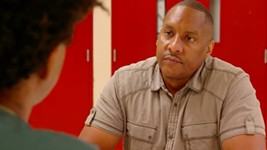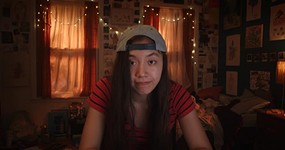SXSW Interview: Bradley Grant Smith’s “Male Gaze Gazes on the Male Gaze” in Our Father
Dick Wolf, Chicago, and the politics of writing female leads
By Selome Hailu, 11:45AM, Fri. Mar. 26, 2021
With his debut film, Our Father, Bradley Grant Smith is officially a multi-hyphenate, adding screenwriting and directing to his previous credits as an actor, singer, and songwriter (he performs his music as Sad Brad Smith).
In the SXSW 2021 film (read our review), sisters Beta (Baize Buzan) and Zelda (Allison Torem) lose their father to suicide. They discover that they have a long-lost Uncle Jerry while settling their fathers’ belongings and, being estranged from most of their other family, try to find him in hopes of bringing a new paternal figure into their lives. Hunting Jerry down proves difficult, and Beta and Zelda meet all kinds of characters from around Chicago as they pick up different clues, while gingerly trying to mend their own tense sibling relationship. The Austin Chronicle caught up with Smith to hear about how he approached creating these complicated women against the backdrop of his hometown.
Austin Chronicle: How do you bring your background as an actor to set as a director?
Bradley Grant Smith: As an actor, I really value a director who's willing to work with me and become my teammate. A lot of times, a good actor can read a script cold without having looked at it before and give a pretty good performance. So they might come on set, and if the director isn't trying to pull more out of them, they'll just coast along their natural talent, which is fine. But when you see certain directors or movies that have great performances across the board, I don't think that's an accident. That's a director who is working to inspire these actors to give their best performance. And listening to other people's ideas. I wrote a lot of these roles for the specific actors, so I was very eager to give them space to bring themselves or change lines here and there. That's where the creation is. The rest is getting everything set up, and then we get to play.
AC: Before Our Father, you were also involved in the SXSW 2019 film Saint Frances with director Alex Thompson (who also produced Our Father). It seems you and your collaborators have an affinity for stories about agnostic 30-somethings who feel lost in life.
BGS: It probably just comes from our truth, you know? I think, generationally, that it is more common now for people in that age range to feel lost or to wonder, “Am I, in fact, lost? Or is this normal?” [There are] new conversations about that, um, that journey for folks.
AC: The title of Our Father puts a spiritual veil over the film. It sounds churchy even though no one goes to church, and it also conjures the presence of Zelda and Beta’s father even though we never meet him. Why so subtle about faith? And did you ever consider making their father more physically present in the film?
BGS: I think it was really the presence of the absence that I was interested in, and extrapolating it into more metaphorical terms, as you were saying, the religious aspect. Things like that. What the structure is of a father, how those affect our lives, even if that imposing force is removed.
What happens in the negative space? How do we restructure our lives all at once? I hesitate to put too [specific a meaning] on it, but as a songwriter, which I do as well, the term “father,” I reference a lot. And in Leonard Cohen songs and things like that, the term “father” can be a stand in for so many things. It can be a God or religion, or literally a father, or patriarchal forces in society. Or even just the desire for a protector. I think I wanted to investigate the way all of those things entangle with each other.
BGS: I love Chicago. It's where I grew up, it's where I went to school, and it's where I've spent my professional life. I was someone who had school spirit or anything like that, and I don't follow the sports teams or anything, but I do feel an affinity to the city. And particularly being in the Midwest, you do get a lot of different people coming and congealing there.
I just like to represent it. Because for the most part, outside of Dick Wolf, Chicago P.D. and Chicago Fire and stuff like that — which are fine shows, and they employ a lot of people — I don't feel like Chicago has had its day on screen. And if we can be a part of helping form some sort of filmmaking scene or collective in Chicago that helps showcase the city, that would make me very happy.
AC: You’ve spoken before about “the male gaze gazing on the male gaze.” Can you elaborate on what that means to you? How does that appear in the way you write women versus how you write men?
BGS: It's a tricky thing to talk about because I don't want to overshadow anyone else's read on things, but again, as a songwriter I'm conscious of symbolism. Initially I knew I wanted to write about siblings, and the decision to make them sisters, as opposed to brothers like my brother and I, was almost arbitrary. In part it was because I wanted to write for Baize and Allison. But once I started writing the story about these two women in search of a man to fill the place of this other man, there were symbolic ramifications and significance to that that I didn't want to ignore. But I also felt like I couldn't pretend to write that story from the inside. So what I tried to do on some level was make the movie aware that it was being written by a man, if that makes sense.
It was an intentionally withdrawn view. And here's where it really gets tricky to put into words—it was more a feeling and fingers-crossed hope that it would play in a way that was interesting and not overstepping any boundaries.
AC: What scenes can you point to where you tried to make the film self-aware about gender?
BGS: We definitely had a conversation about Allison's wardrobe, because there was one line in the script that talked about her having a low-cut top. And when we were trying things out, Allison brought a bunch of things to wear. And the top that we ended up going with was very revealing, and we had a discussion about whether that was too much. It ended up sort of being even more revealing than we anticipated, but decided that that was a case [where we could] lean into it, that the film was almost daring the audience to objectify her while people in the film were doing it as well.
Also, throughout the movie, it's the two of them encountering man after man after man. Eventually that became intentional. It was organic at first. And then again, it was like, “Are we going to lean into this? Or we can lean away from it.”
AC: Zelda and Beta are such interesting names. Did they come from anything in particular?
BGS: I did do some research into the names in the beginning, and there are some Easter eggs in the script to folks that I knew. But I also kind of liked the alphabetic nature of the names. Beta in the movie is maybe closer to the top of the societal food chain, but she's still a beta in this world of Our Father. And then Zelda is almost trailing along at the end, like the caboose.
AC: Tell me about the choice to make the intermediaries on Beta and Zelda’s journey mostly men instead of women.
BGS: I knew that I wanted [them to have] half brothers, but I wanted the [half brothers’] mother in there as well. Not [Beta and Zelda’s] mother. And attempt to play with the ways in which society can twist other people into taking part in [patriarchy]. I don't think she's a particularly positive or, or sympathetic figure. It became intentional that, aside from a few key points [like] the women who Zelda lives with, that [the sisters would] be having to trudge through these fellas.
Our Father
Narrative Feature Competition
World Premiere
Read our review here.
A note to readers: Bold and uncensored, The Austin Chronicle has been Austin’s independent news source for over 40 years, expressing the community’s political and environmental concerns and supporting its active cultural scene. Now more than ever, we need your support to continue supplying Austin with independent, free press. If real news is important to you, please consider making a donation of $5, $10 or whatever you can afford, to help keep our journalism on stands.
Kevin Curtin, April 18, 2021
Shane Pfender, April 7, 2021
Sept. 10, 2021
SXSW 2021, SXSW Film 2021, Our Father, Baize Buzan, Allison Torem, Bradley Grant Smith











